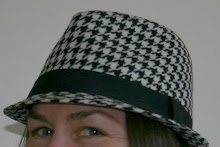Puddling for nest material. Cliff Swallows are major engineers creating massive mud-daub-nest colonies under bridges. These were busy gathering mud, rolling it up in and onto their beaks. It is so amazing the variety of nests birds make by use of feet an beaks.
Though this Swallow looks similar to those above it has a deeply forked tail and does not nest in large colonies, although it does make mud nests attached to structures. Its a Barn Swallow. When I was young swallows made nests under an open shed and my Mother made sure we knew not to disturb them as she considered them "lucky" birds. My father said if a swallow flies at the forefront of your canoe it foretold a good journey.
Western Kingbird.
One of my bird books states the Western Kingbird is not abundant in Alberta and as its the first time I have ever seen them I guess they are not abundant in the western part of the province though they sure were plentiful from Empress to Hanna.
Eastern Kingbird
The Eastern Kingbird on the other hand is abundant throughout the southern part of the province. Kingbirds are flycatchers notorious at retrieving bugs on the wing.
Lark Sparrow
This beauty was everywhere in the grasslands. It seemed once we spotted our first we then saw them often on the fence lines and posts. To our delight there were a couple that spent much time serenading each other at the campsite.
Lark Sparrows flirting on the road. Not a great shot but an interesting one taken through the vehicle window.
Chestnut-Collard Longspur
Once an abundant bird in Alberta this species has declined as it does not survive in cultivated landscapes, it needs undisturbed prairie grasslands. I feel blessed to have seen this one an only beauty.
Vesper Sparrow
I tend to acquire used bird books when I find them as it seems no one book gives all the birds or all the markings to look for. Recently I picked up a field guide Birds of North America and must say that the comparison charts especially for sparrows has helped greatly in identification.
Clay-colored Sparrow
At least I think it is.
Before leaving Empress we went for a picnic down by the river and as we left the river bank four Curlew's flew overhead, of course to my dissapointment my settings were not set to capture flight shots and it all happened so fast there was no time to make changes. So can you imagine the delight when we stopped to photograph these wee bunnies
and...
up-ahead this strange large bird bird of the open range prairies and its mate obliged by being alongside the road way. Its a Long-billed Curlew, what a nice sendoff for our north-home-ward journey. The Curlew is another declining bird due habitat loss. We watched these two from the vehicle so as to enjoy the moment without flushing or rushing them off so when they did take flight I again missed the flight shots due sitting in the vehicle. Oh well, such is the nature of bird photography.
Enough memories told for today, have a wonderful day and fill it with a smile.
Hugs!
















2 comments:
Oh, I just love all of your photos Tess. Those birds better have good landing vision when landing on those barbed wire fences. Thanks for sharing!
Sad that habitat loss has harmed birds and other wildlife. What habitat is left is fragmented.
Red Deer River Naturalists usually do a field trip[ to Empress.
Post a Comment